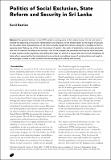| dc.contributor.author | Bastian, Sunil | en |
| dc.date.accessioned | 2016-01-27T14:06:21Z | |
| dc.date.available | 2016-01-27T14:06:21Z | |
| dc.date.issued | 01/03/2009 | en |
| dc.identifier.citation | Bastian, S. (2009) Politics of Social Exclusion, State Reform and Security in Sri Lanka. IDS Bulletin 40(2): 88-95 | en |
| dc.identifier.issn | 1759-5436 | en |
| dc.identifier.uri | https://opendocs.ids.ac.uk/opendocs/handle/20.500.12413/8128 | |
| dc.description.abstract | The general election in mid?1977 marked a turning point of Sri Lankan history. On the one hand, it marked the beginning of economic liberalisation and emphasis on the private sector as the engine of growth. On the other hand, representatives of the Tamil minority fought the election asking for a mandate to form a separate state. Making use of the two dimensions of capital ? the realm of exploitation and surplus extraction, and that of coercion including state security ? this article analyses the processes ensuring the social exclusion of large sections of the population and setting the stage for conflict. It argues that the current orthodoxies of state reform supported by the international community do not address issues of social exclusion and need to be rethought in order to avert violence and ensure long?term stability and security. | en |
| dc.format.extent | 8 | en |
| dc.publisher | Blackwell Publishing Ltd | en |
| dc.relation.ispartofseries | IDS Bulletin Vol. 40 Nos. 2 | en |
| dc.rights.uri | http://www.ids.ac.uk/files/dmfile/IDSOpenDocsStandardTermsOfUse.pdf | en |
| dc.title | Politics of Social Exclusion, State Reform and Security in Sri Lanka | en |
| dc.type | Article | en |
| dc.rights.holder | © 2009 The Author. Journal compilation © Institute of Development Studies | en |
| dc.identifier.doi | 10.1111/j.1759-5436.2009.00027.x | en |

